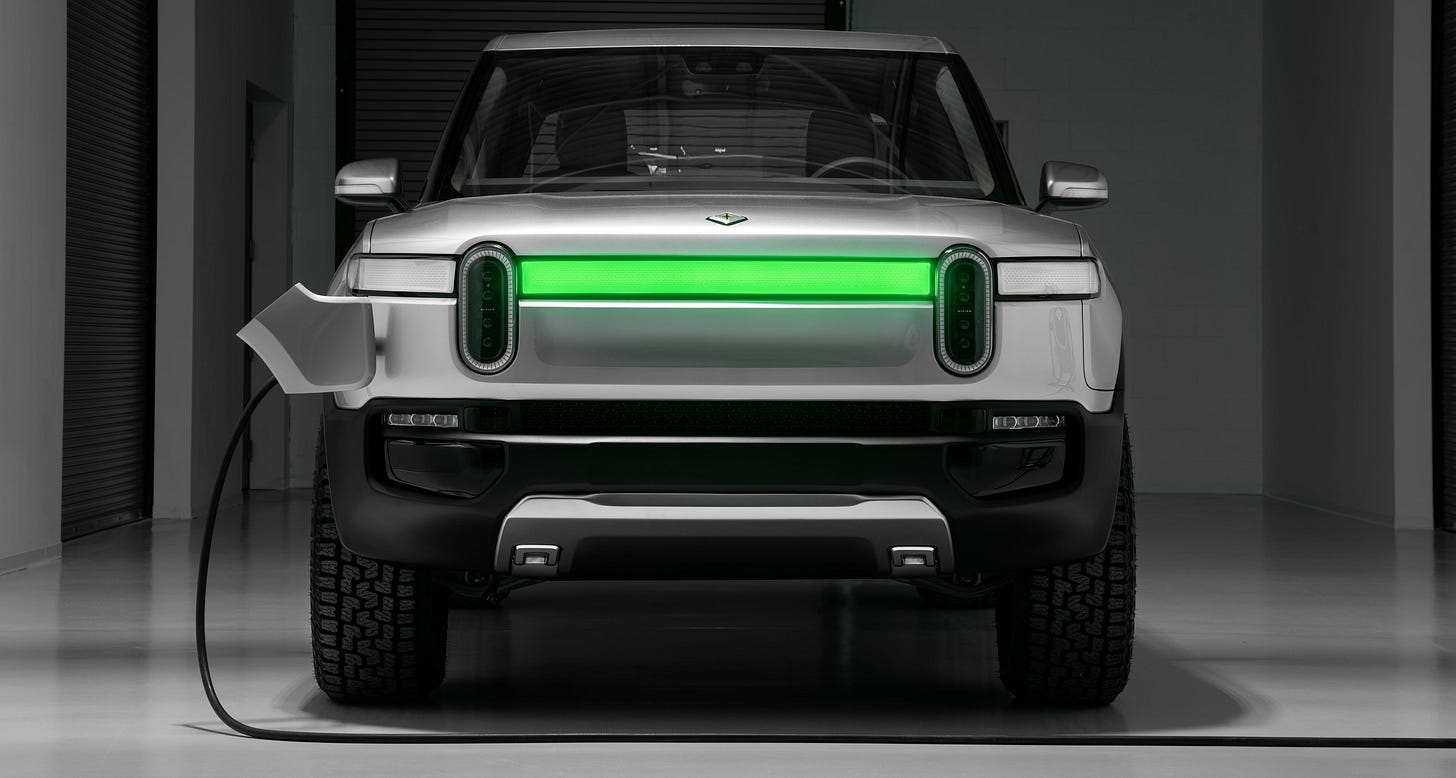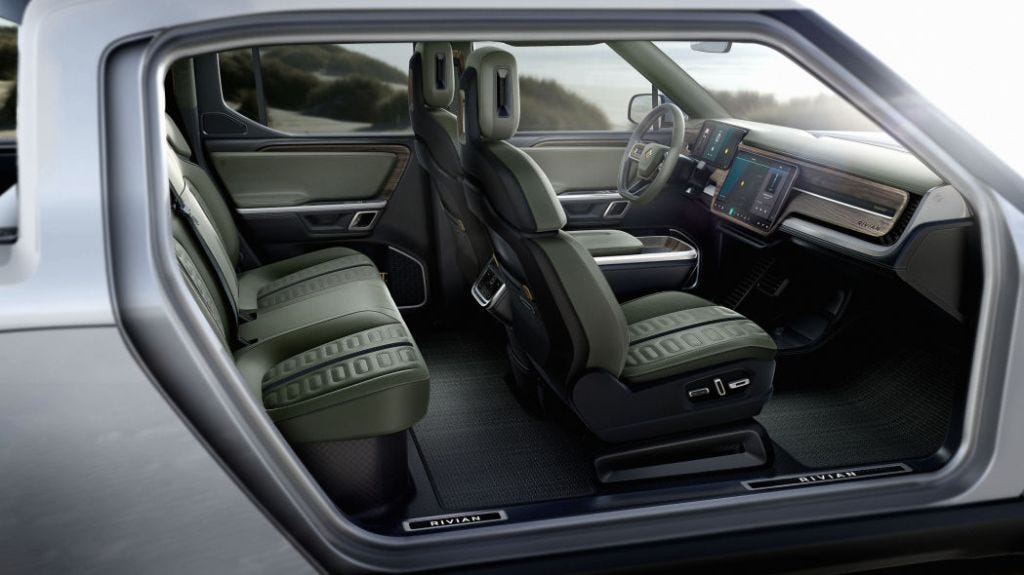Volkswagen Group (VW) took a strategic initiative to advance its position in the rapidly evolving electric vehicle (EV) sector by announcing a substantial investment of up to $5 billion in U.S. based EV manufacturer Rivian (25 June 2024).
Rivian has steadily increased its production capacity, delivering 57,232 vehicles in 2023. It successfully launched its first two consumer vehicles - the R1T electric pickup truck and R1S electric SUV - to exceptionally positive reviews, with the R1T being named MotorTrend's 2022 Truck of the Year.
However, like many EV startups, Rivian has faced difficulties in scaling up production to meet demand and projections. Finding itself in the growth phase of its evolutionary cycle, it is yet to achieve profitability, although losses have been declining sequentially as the unit economics of the business improve with scale. The VW deal will solve both of these challenges, acting like a steroid injection, rapidly accelerating the scaling up of the EV business.
Other niche EV manufacturers, such as Tesla, have taken a different approach. Rather than collaborating with big names in the auto industry, it has chosen to diversify into ancillary segments in an attempt to augment its electric vehicle production business. It seeks to position itself as a comprehensive sustainable energy company with a focus on clean energy products such as solar panels and energy storage systems, battery technology, charging infrastructure and autonomous driving taxis. This is a dangerous strategy which risks the business becoming a jack of all trades, master of none.
More particularly, the Tesla approach requires investors to throw caution to the wind and to allow Elon Musk free reign over how he deploys their money. This is dangerous with a maverick CEO like Musk. For instance, Tesla had initially placed a large order for Nvidia's H100 AI chips, intending to use them for AI training and to enhance its autonomous driving capabilities. In what can only be described as a patent conflict of interest, Musk subsequently confirmed that due to demand exceeding supply for these chips, he had unilaterally taken the decision to divert these H100 chips to his other companies, specifically his AI startup xAI and social media platform X (formerly Twitter). This decision will adversely affect Tesla's AI and autonomous driving development plans.
At least with the focused approach of Rivian, investors understand that they are exposed purely to the growth of EVs and that there are no conflicts of interest likely to have a negative impact on their returns on their investment.
The Joint Venture
VW consistently ranks among the top two largest automakers in the world by sales volume, competing with Toyota for the top spot. In Europe, VW is the undisputed market leader, with sales 48% greater than its closest rival.
Maintaining that dominant position requires heavy investment and in 2021 alone, the company spent a staggering 15.6 billion Euros on R&D, surpassing all other automakers. In addition to fueling organic growth through OPEX, it also utilizes CAPEX to grow through acquisition. Accordingly, the investment in Rivian perfectly fits its modus operandi. Perhaps it will eventually add Rivian as a wholly owned subsidiary to its stable of brands - although I am speculating, this recent investment paves the way for that to happen.
In the event that you are unfamiliar with the brands owned by VW, here are the primary names (there are others):
Volkswagen: It’s own brand, known for popular models like the Golf, Passat, and ID series of electric vehicles.
Audi: The group's luxury brand, competing with the likes of BMW and Mercedes-Benz.
Porsche: High-performance sports cars and luxury SUVs.
SEAT: A Spanish brand focusing on sporty, youthful vehicles.
Škoda: A Czech brand known for affordable, practical vehicles.
Lamborghini: Italian supercar manufacturer.
Bentley: Ultra-luxury British car maker.
Bugatti: Exclusive Super-car manufacturer (Note: Bugatti is now part of a joint venture with Rimac, but Porsche, a VW Group brand, retains a stake).
Commercial Vehicles: Volkswagen Commercial Vehicles, MAN, and Scania for trucks and buses.
Ducati: Italian motorcycle manufacturer.
The list above includes segments including vehicles used for utility, sports, luxury and commercial purposes, plus motorcycles. The gap, currently, is a pure play EV manufacturer.
Initially, the Rivian collaboration will be structured as a 50/50 joint venture, with both companies sharing equal control and ownership. This partnership is expected to be finalized by the end of 2024, following months of preliminary work to ensure compatibility between Rivian's technology and VW Group's products.
The partnership aims to accelerate the development of software-defined vehicles (SDVs) and cutting-edge electric vehicle technology. By leveraging Rivian's intellectual property rights within the joint venture, Volkswagen seeks to expedite its efforts in creating advanced battery-powered vehicles and sophisticated software solutions.
The primary objective is to combine VW manufacturing expertise with Rivian's innovative approach to electric vehicle design and software development. The joint venture will focus on adapting Rivian's current software and electrical architecture for use in Volkswagen Group vehicles, potentially benefiting brands such as Audi, Porsche, Bentley, and the emerging U.S. Scout brand. Vehicles featuring technology developed through this collaboration are anticipated to debut in the latter half of this decade.
The Investment
The VW investment in Rivian will be structured in multiple phases. Initially, it will contribute $1 billion to Rivian in the form of an unsecured convertible note, set to convert into Rivian shares on or after December 1, 2024. Subsequently, VW will invest an additional $2 billion in Rivian shares through equal installments in 2025 and 2026. The remaining $2 billion will be allocated to the joint venture, with $1 billion invested immediately and another $1 billion made available as a loan in 2026. This phased approach allows for a gradual integration of resources and expertise between the two companies while providing Rivian with substantial financial support for its ongoing operations and future development.
Other Investors
Around 28% of shares are held by insiders. The 10 largest institutional shareholders of Rivian in December 2023 were:
Amazon, the largest shareholder in Rivian with 158.36 million shares, appears to have put its money on the correct horse in the EV race. Recognizing Rivian's potential, not only did it take a substantial equity stake in the business, but Amazon will also be a key customer. It will use Rivian vehicles for its delivery fleet and currently has 100,000 electric delivery vans on order.
Winning the support of both Amazon and VW demonstrates strong confidence in Rivian’s potential.
Conclusion
In an industry where scale matters, the collaboration between Rivian and VW is significant for the niche EV manufacturer.
The substantial investment from VW provides Rivian with much-needed financial support, underpinning the company's future prospects and technological capabilities.
This partnership could potentially reshape the competitive landscape of the electric vehicle market, combining Volkswagen's global manufacturing scale with Rivian's innovative approach to EV design and software development.
Who else would enjoy this?








